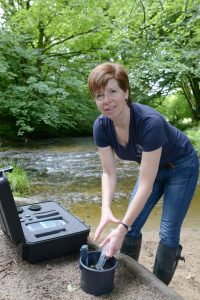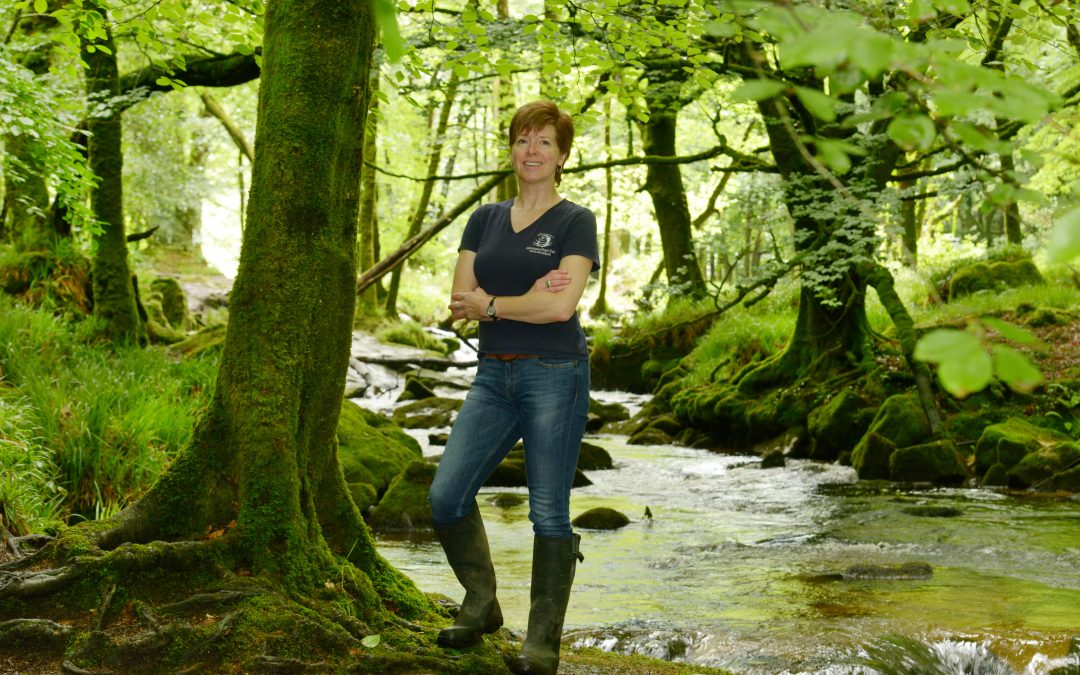Growing up on a livestock farm on Bodmin Moor helps Hazel Kendall understand the many pressures that farmers are under, which she says is crucial to her role as Head of Land Management at the Westcountry Rivers Trust. Hazel works with farmers to help them protect their local river, by making changes to the way they manage their land. Focused mainly on the Tamar catchment, which stretches from the rugged north coasts of Devon and Cornwall down to Plymouth, Hazel also coordinates the environmental charity’s team of farm advisors across Devon and Cornwall’s rivers.
Through the South West Water- funded environmental project Upstream Thinking, the Westcountry Rivers Trust has been able to significantly step up its work with farmers. This multi-award-winning catchment management scheme is based on the principle that agricultural practices have a huge impact on water quality. It is a proactive approach to solving problems to bring about improved water quality as well as wider benefits. The focus is on offering practical advice to farmers so they can make changes that will improve water quality. This could be something as simple as good soil management to minimise erosion, moving a gateway to slow down run off, or erecting a new fence to protect watercourses from direct livestock access. The project has also enabled larger yard infrastructure work, and given farmers support to reduce risks from pesticides to stop pollutants entering the river. Hazel emphasises that these need to be “win-win” solutions, which not only benefit the local river but also help make the farmer’s life easier, and crucially save money.
 Maintaining links with the farming community – her younger brother now runs the family beef and sheep farm – helps Hazel find practical solutions that balance the potential benefits to the environment and local wildlife with a farmer’s priorities. She says, “While I’m no longer totally ingrained in the farming community, my work allows me to contribute to farming life and I can see things through their eyes. I don’t think anyone goes out of their way to deliberately pollute, it’s often a consequence of the pressures of everything else. It’s about being pragmatic and recognising there’s a limit to what people will do. We’re there to offer a fresh perspective and solutions; as we have no regulatory powers we can build up a level of trust, but it takes time.”
Maintaining links with the farming community – her younger brother now runs the family beef and sheep farm – helps Hazel find practical solutions that balance the potential benefits to the environment and local wildlife with a farmer’s priorities. She says, “While I’m no longer totally ingrained in the farming community, my work allows me to contribute to farming life and I can see things through their eyes. I don’t think anyone goes out of their way to deliberately pollute, it’s often a consequence of the pressures of everything else. It’s about being pragmatic and recognising there’s a limit to what people will do. We’re there to offer a fresh perspective and solutions; as we have no regulatory powers we can build up a level of trust, but it takes time.”
Perhaps it is also Hazel’s experience of other cultures that has given her the ability to see things from different perspectives. She joined the Westcountry Rivers Trust nine years ago, after graduating from Plymouth University, where, as a mature student, she achieved a first class degree in Environmental Resource Management. Independent and practical by nature, she says she “couldn’t wait to leave school and start working”, but soon realised that she was being held back by her lack of qualifications. Taking Business Studies at Saltash College helped her secure a job working for a shipping company, which also allowed her to indulge her passion for travel, which saw her apply to emigrate to Australia when she was in her 20s.
She says: “I have always been interested in understanding and seeing first hand other landscapes, cultures and systems. We have very few ‘wild ’open spaces left in the UK so I feel very lucky to have visited Australia and Canada as well as Brazil and Tanzania. These places really open your eyes to the scale of water-related issues which confront society globally. I think it’s incredibly important for any nation to value and protect its natural resources – not least to be able to feed itself, and land management and water usage are absolutely key to that.”
Reflecting on what drives her in what is clearly a complex role, she says, “Everyone who works for the Westcountry Rivers Trust is passionate about what they do. Making a positive difference is what drives us, and the most rewarding part of the job is when a farmer tells me about how things have been made better. You can monitor, measure and write a report to demonstrate positive results from your work, which is great, but there’s nothing more rewarding than hearing a farmer tell us first hand their livestock are looking better, or they get more grass than they used to, or the yard’s much easier to keep clean. If they also tell us they’ve seen a kingfisher for the first time in years, or that salmon are returning to their rivers, then I know we’re doing a good job.”
See the feature here http://www.plymouthherald.co.uk/farmer-s-daughter-is-guardian-of-westcountry-rivers/story-29541225-detail/story.html

